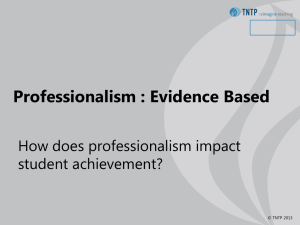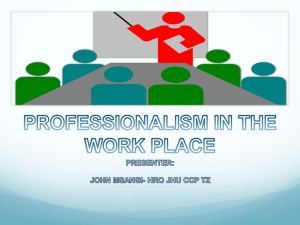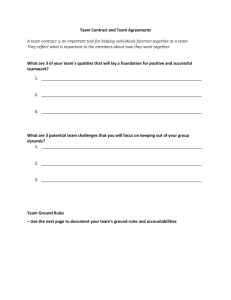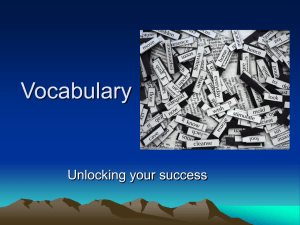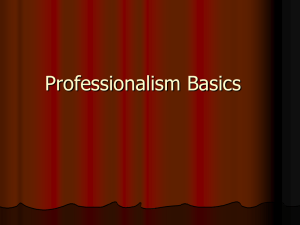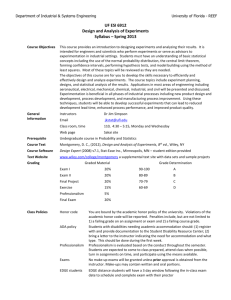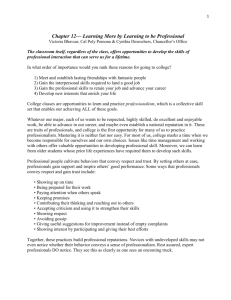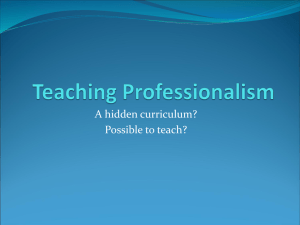Professionalism – a definition
advertisement
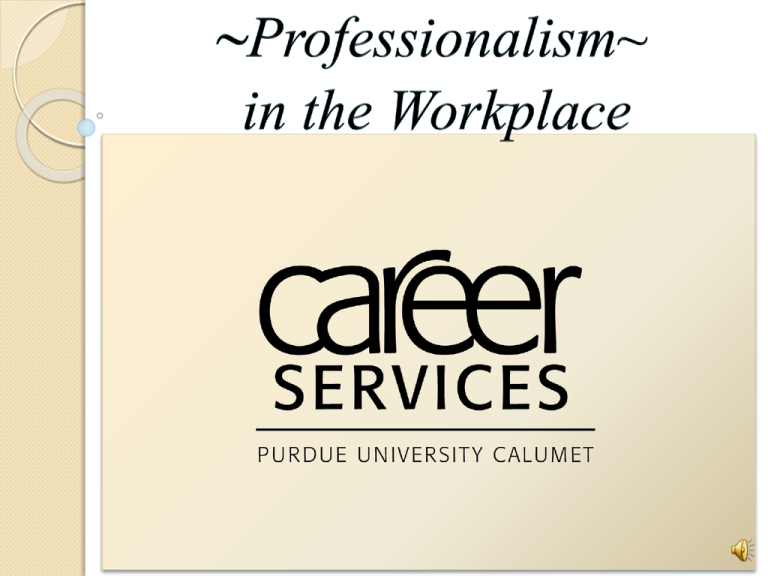
Professionalism – a definition Knowledge that an individual possesses about a certain field Constant and consistent behavior An attitude devoid of politics, mind games, bias, discrimination and blaming A professional person – an individual doing their job with sincerity who maintains accepted etiquette and ethics while performing quality work Professionalism – behavior expected Avoid discussion of personal issues so that the environment is free of empathy related bias about productivity. Avoid gossip, colleague bashing, listening to and relaying rumors to co workers that come through the grapevine. Rules, policies and procedures should be the same for everyone – preferential treatment lowers morale and perpetuates poor productivity while lowering self esteem. Professionalism – behavior expected Accountability – take responsibility for your actions/mistakes. Be a team player who can also work independently. Support and encourage colleagues and co-workers and avoid constant complaining. Speak with courtesy to all internal and external customers and co-workers. Respect people and their position. Professionalism – behavior expected Follow through on deadlines. Keep your word; fulfill agreements and obligations both legally and morally. Strive for recognition on the basis of your work performance. Give credit to others. Be proud of your work and let others know how much satisfaction it gives you. Show enthusiasm – it is contagious. Be flexible and patient; learn to collaborate. Grievances, Personal and Business Problems Handle grievance through proper channels. Discuss them directly and privately with those authorized to make adjustments. Refrain from complaining and grumbling to others. Negativity is contagious! Be sensitive to the problems of fellow workers. Consider the effect your actions have on the welfare of fellow workers. Employer’s Policies Discrimination, sexual harassment, and other policies implemented at your workplace can usually be found on the company’s Human Resources website. Learn what the expectations are and what to do if you feel that any violations have taken place against you or anyone in your office. What is Professional Dress? Dress accordingly to the recommendations of your supervisor. Departments may specify dress guidelines specific to the department and your job. In general, dirty, torn, or offensive clothing are not accepted (offensive in wording or graphics on clothing, or clothing that is too tight or revealing) are not appropriate for professional environments. Professional dress varies from company to company. Review this link for examples: http://humanresources.about.com/od/workrelationships/a/dress_co de.htm Professional Communication Practice active listening. Use proper language – slang, profanity and vulgarity are not acceptable. Don’t yell information across the room. Speak clearly; confirm that you are being understood and that you understand what is being said to you. Maintain a pleasant, courteous tone of voice. Avoid emotional or angry outbursts. Acknowledge the needs of internal and external customers and co-workers. Create a friendly environment but respect boundaries. Why is Professionalism Critical in the Workplace? Ensures positive performance Builds and maintains team spirit Encourages motivation Creates happy, satisfied employees that are positive organization ambassadors Quality of work improves – employees feel that their work is important Fosters clear and collaborative communication Promotes and confirms fairness for every employee – everyone treated equally – eliminates favoritism Strong Ethics = large part of Professionalism Ethics is a code of morality – a system of principles governing the appropriate conduct for a person or group. Integrity, honesty, diligence, loyalty, respect and commitment are all part of an ethical character which in turn exemplifies professionalism. Maintaining confidentiality – certain information cannot be discussed or shown to others. The welfare of others is important and the professional maintains this confidence. Remember….. ~A professional learns how to balance confidence, assertiveness and humility, never allowing anyone to persuade them to change their code of ethic's or lower their standards.~ Information You Can Use Career Services/Student Employment Office is located in SUL, room 349. Hours: M – F, 8 – 4:30 pm, Wednesdays, 8 – 7:00 pm (except for holidays and breaks) For more information, come to the office or call: 219.989.2600. We look forward to meeting you!


